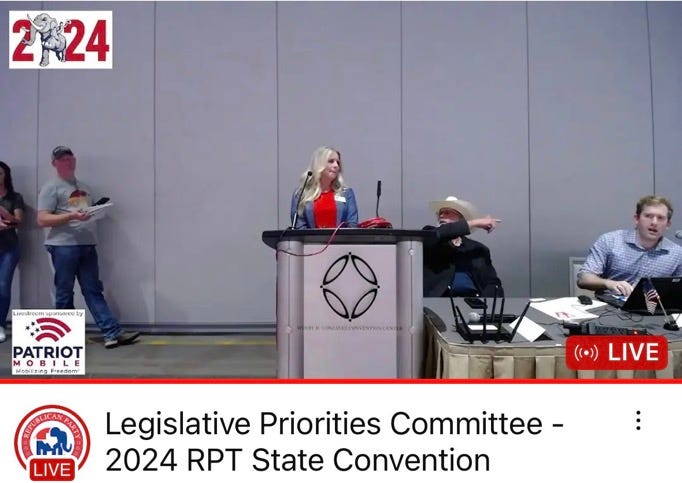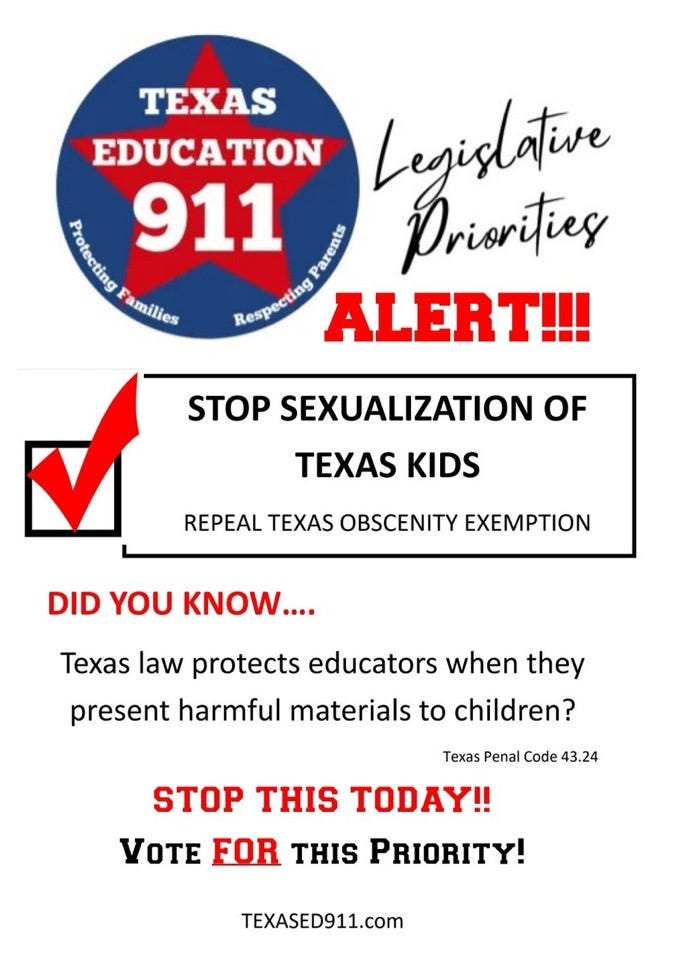Breaking: Texas GOP's Newly Announced Legislative Priorities Preview the Fights of 2025
People get ready.


The first thing you should know about the Republican Party of Texas’s “Stop Sexualizing Texas Kids” subcommittee is that it doesn’t exist to prevent the sexualization of Texas kids. In fact, some of the initiatives it backs would likely have the opposite effect: the group opposes sex education that has been proven to lead teens to delay sexual activity and make them less vulnerable to abuse, for example, and it fights to ban from Texas schools memoirs from sexual assault survivors and novels about the dangers of sex-trafficking.
So what does the “Stop Sexualizing Texas Kids” subcommittee do? What is it for? Mostly, it’s a space for some of the state’s most cynical political operatives to manipulate some of the state’s most fearful citizens in order vilify perceived political enemies and suppress certain ideas.
In Texas in 2024, that means attacking teachers, librarians, public schools, and LGBTQ people. Two concerns seem to animate the group: 1) making sure that Texas schools never acknowledge—much less celebrate—the existence of LGBTQ individuals by equating information about LGBTQ lives with “sexualization,” and 2) driving up fears of “sexualization” in schools in order to score political wins.1 As I wrote last year:
[T]he group has spent the past few months taking aim at Pride celebrations, at sex education, at inclusive classrooms and libraries, and at free academic inquiry for high school students. They’ve sought to score political points by villainizing “the left,” teachers, librarians, and—most especially—LGBTQ individuals. They’ve openly advocated for discriminating against trans teachers and they’ve purposefully made life more difficult for LGBTQ children. And in order to accomplish all of this, they’ve tried to tar their enemies with the awful specters of pedophilia and child abuse.
Ahead of last month’s party convention in San Antonio, the group sent a letter to the GOP recommending that the party “include a legislative priority that protects children from sexual grooming which purposefully desensitizes them to sexual topics, exposes them to sexual content, normalizes sexual behavior for children, and breaks down a child’s natural boundaries which makes them more vulnerable to risky behaviors causing life-long consequences, sexual abuse, sexual exploitation, and sex trafficking.”
And today the Republican Party of Texas announced that it is doing just that. “Stop Sexualizing Texas Kids” will be one of the GOP’s eight top legislative priorities for the 89th Legislature, which convenes in January of 2025. If you thought the war on books was over, think again.
“Stop Sexualizing Texas Kids” was also a Republican priority ahead of the last legislative session, and the committee behind it counted as wins the passage of anti-book bill HB900, along with SB12, which banned gender-affirming care for minors in the state. The committee lost some big battles, too, but the group is close enough to the heart of power in the party, and influential enough within the legislature in general that we should pay attention to their objectives so that we can prepare for the battles we’ll face next year.
The committee has proposed four goals for the next legislative session:
Prohibiting taxpayer funding to any entities that permit or promote sexually inappropriate content to minors and legislatively banning instruction on sexual orientation and gender ideology in schools and libraries.
Repealing affirmative defenses in Texas penal codes (43.24, 43.25) and redefining “harmful materials” to remove loopholes provided by the modified Miller Test.
Establishing an independent Inspector General for education to investigate fraud, waste, abuse, and criminal conduct within schools and refer to prosecutorial authorities.
Compelling Superintendents to report sex crimes within schools to outside law enforcement. Removing immunity from civil liability of schools and their employees.
Each of the first three goals deals with books or the availability of information. The first proposal is a Florida-style “Don’t Say Gay” bill—the GOP tried unsuccessfully to get this passed in 2023. The third proposal is, in part, an attempt to add teeth to bills like HB900 by creating a Grand Inquisitor “Inspector General” who would be empowered to investigate violations of the law by educators and school administrators.
But I want to zoom in on the second bullet point, because that was the emphasis for committee members in the Legislative Priority Committee and their backers among Republican activist groups. That bullet point consists of two propositions: repealing the affirmative defenses in the Texas Penal Code that say that individuals can’t be prosecuted for providing “harmful materials” to minors if they have a “scientific, educational, governmental, or similar justification,” and changing the definition of “harmful materials” to no longer require the consideration of works “as a whole,” their “dominant theme,” or their “redeeming social value.” In other words, the committee is asking for the law to criminalize the distribution of books based on excerpts rather than the work as a whole.
Without the second proposition, the first isn’t a big deal; there are no books in any Texas schools or libraries that meet the legal definition of “obscene” or “harmful to minors.”
Let me say that again: There are NO books in Texas schools that meet the legal definition of “obscene” or “harmful to minors.”
Those legal terms are a high bar—books that are obscene are literally outside of the protection of the 1st Amendment.2 Anything you can buy at Barnes & Noble or on Amazon is by definition not obscene, and if it were “harmful to minors,” then those stores would be required to ID anyone entering. Think about it: the last time you went to Barnes & Noble, were you carded? But you can buy Looking for Alaska, The Perks of Being a Wallflower, even Gender Queer at Barnes & Noble, can’t you? That’s a sign those books are not legally obscene or harmful to minors.
The leaders of the “Stop Sexualizing Texas Kids” know this, and it frustrates them. They want to put people in jail for distributing The Perks of Being a Wallflower, and the pesky law doesn’t allow it.
That’s where the second proposition comes in. Christin Bentley, the leader of the 2023 Stop Sexualizing Texas Kids initiative, explained it in her testimony before the RPT’s Legislative Priorities Committee: “The way that the law is written currently, the way that we define harmful materials, what we are saying is that a little bit of porn in a big book is no longer harmful to children. And that is not true, and so we need to redefine ‘harmful materials.’”
This is a radical proposition. There are good, important reasons the law requires judgements about a book’s potential obscenity or harmfulness take into account the work as whole and its redeeming social/scientific/educational value. Taking those “loopholes” away from the “harmful to minors” definition could make it a felony to sell a seventeen-year-old books like Looking for Alaska or Beloved. It would also likely outlaw many sexual education books written for teenagers.
I want to reiterate that: this change would outlaw the sale of such books to anyone under 18 years of age. Book banners have defended themselves from charges of book banning by saying they’re just focused on making sure school libraries only contain age-appropriate materials; this push shows that was always a lie. If the legislature passes the bills proposed by this committee, anyone—teacher, public librarian, bookseller—who makes certain books available to anyone under 18 could face felony prosecution. Obviously, that would also affect publishing decisions. This is part of the plan: as I mentioned last year, committee leader Christin Bentley has said that “when we allow these things to even be sold to children in the bookstores, we’re complicit. We’re allowing it. We have allowed way too much.”
How worried should we be that these propositions might become law? I don’t know. The Texas GOP often puts extreme things on its platform that never get a serious hearing at the Capitol. What’s more, the Stop Sexualizing Texas Kids committee tried to get both propositions written into law in 2023, and both died in committee. That said, this year’s primaries pushed the GOP further to the right than it has ever been, and it’s not a great sign that the party made “Stop Sexualizing Texas Kids” one of its top legislative priorities for the next session. “We did not have the appetite” for passing these changes into law last session, said Bentley last week. “We do now.”
Since we know that Republican legislators are going to try to pass laws that encompass these two propositions, we need to be ready—and ready to resist their attempt at a “Don’t Say Gay” law, and their attempt to villainize teachers by creating a Grand Inquisitor “Inspector General” for schools. We need to be prepared to counter their arguments, to make sure moderate and persuadable legislators are aware just how extreme these measures are.
And we need to recognize that these propositions represent the next phase of the war on books, educators, public schools, and LGBTQ individuals in Texas. HB900, which has been partially enjoined as unconstitutional by Republican-dominated courts, did not give the party’s extremists what they want.3 Now—angry and exasperated—the state’s book banners are hoping to use harsh punishments to intimidate the people they see as their opponents.
While not all of the supporters of the Stop Sexualizing Texas Kids priority back vouchers, for example, their work has helped create a narrative that voucher proponents have found very useful. The committee is often celebrated in the Texas Scorecard, a propaganda website funded by anti-public school Christian nationalist billionaires Tim Dunn and Farris Wilks.
“Obscenity” in the US is determined by what is called “the Miller Test,” a three-pronged rubric that says that, in order to be obscene, 1) the average person, applying current community standards, must find that the work, taken as a whole, appeals to prurient interests; 2) the work depicts or describes in a patently offensive way sexual conduct as defined by state law; AND 3) the work, taken as a whole, lacks serious literary, artistic, political, or scientific value. The work has to meet all three prongs of the Miller test in order to be judged “obscene.” In the Texas Penal Code, the test for whether or not material is “harmful to minors” is based on a similar, three-pronged test often described as a “modified Miller Test.”
At the Legislative Priorities Committee meeting, Stop Sexualizing Texas Kids Committee member Christie Slape, of Round Rock, was asked if HB 900 has had a measurable effect on the books in her district. “In my school district, absolutely not,” she said.




I think that picture is of our homegrown M4L Christie Slape, of RRISD Hate Slate fame. Thank you for keeping us updated. I am keeping an eye out for their whole disgusting platform. Please post a link somewhere if you see it. And I'm ready.